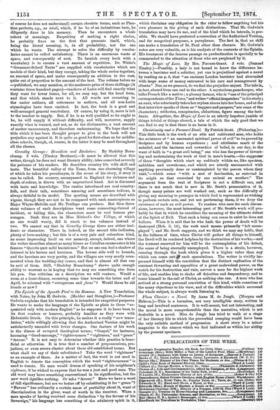the existence of" an uncreated spiritual power of evil "to
be proved by Scripture and by human experience ; and attributes mach of the unbelief, and the haziness and cowardice of belief, in our day, to the want of faith in "a great evil being," one who has the power of thwart- ing and undermining the work of God in men's hearts,—the suggester of those "thoughts which start up suddenly within us, like spectres, unbidden and unwelcome, and which are utterly unconnected with anything previously done or contemplated by the person whom they visit,"—which come "with a sort of fascination, as external in its origin as that exercised by one animal on another." The argument from the text of Scripture is not a difficult one, and there is not much that is new in Mr. Scott's presentation of it, though many points are well worked out, such as the difficulty of giving any meaning to passages in which God is represented as wishing to perform certain acts, and yet not performing them, if we deny the existence of such an evil power. To readers -who care for such discus- sions, however, the most interesting. part of Mr. Seott's work will pro- bably be that in which he considers the meaning of the ultimate defeat of the Spirit of Evil. That such a being can cease to exist he does not believe. When it is said that he who bath the power of death will be destroyed (Hob. ii. 14), the verb used means primarily "left unem- ployed "; and Mr. Scott suggests, and we think we may say holds, that in the fullness of time, when Christ will gather all things to himself, the Devil will be rendered helpless by the destruction of his works,—and the torment reserved for him will be the contemplation of his defeat,. the souse of being eternally unemployed. There is a strain, however, running through the book which gives it a higher value than any which can come out such speculations. The writer is vividly im- pressed himself with the conviction that the distinct realisation of the constant thwarting and opposition of a great malevolent power, on the- watch for his destruction and ruin, nerves a man for the highest work of life, and enables him to shake off dejection and despondency, and to rouse himself to the call of Christ, as nothing else can. A man who has arrived at a strong personal conviction of this kind, while conscious of the many objections to his view, and of the difficulties which surround the whole subject, is always worth listening to.






























 Previous page
Previous page